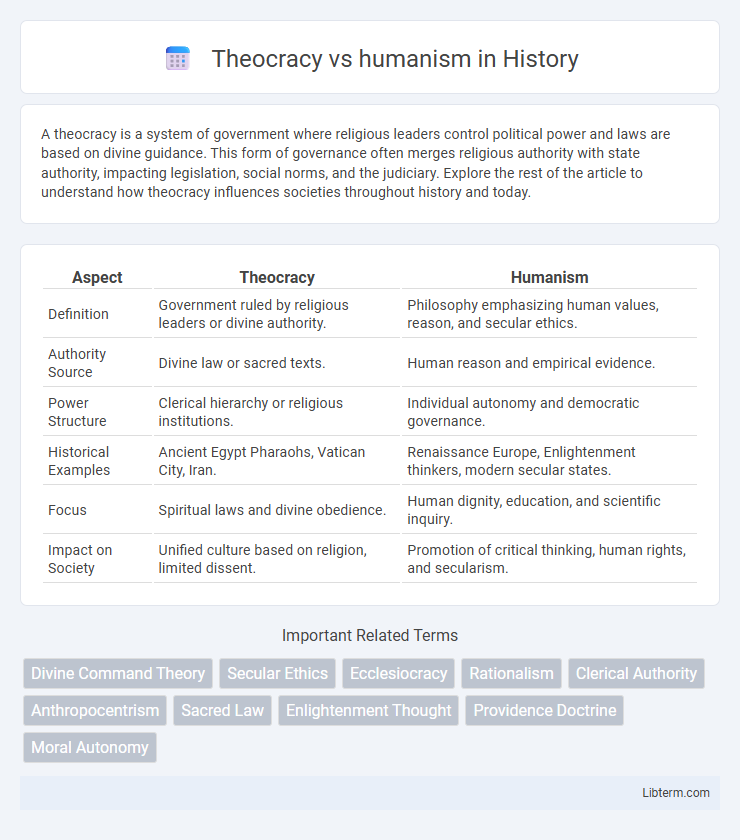A theocracy is a system of government where religious leaders control political power and laws are based on divine guidance. This form of governance often merges religious authority with state authority, impacting legislation, social norms, and the judiciary. Explore the rest of the article to understand how theocracy influences societies throughout history and today.
Table of Comparison
| Aspect | Theocracy | Humanism |
|---|---|---|
| Definition | Government ruled by religious leaders or divine authority. | Philosophy emphasizing human values, reason, and secular ethics. |
| Authority Source | Divine law or sacred texts. | Human reason and empirical evidence. |
| Power Structure | Clerical hierarchy or religious institutions. | Individual autonomy and democratic governance. |
| Historical Examples | Ancient Egypt Pharaohs, Vatican City, Iran. | Renaissance Europe, Enlightenment thinkers, modern secular states. |
| Focus | Spiritual laws and divine obedience. | Human dignity, education, and scientific inquiry. |
| Impact on Society | Unified culture based on religion, limited dissent. | Promotion of critical thinking, human rights, and secularism. |
Defining Theocracy: Governance by Divine Authority
Theocracy is a system of governance where political power is derived from divine authority, often embodied in religious leaders or institutions who claim to implement the will of a deity. This form of rule integrates religious laws with state laws, leading to policies shaped by sacred texts and spiritual doctrines. Unlike humanism, which emphasizes reason and human values, theocracy prioritizes divine command as the ultimate source of legitimacy and moral guidance.
Understanding Humanism: Centering Human Values
Humanism centers on human values and the importance of reason, ethics, and justice without reliance on divine authority, emphasizing individual dignity and critical thinking. It contrasts sharply with theocracy, which bases governance and moral codes on religious doctrines and the authority of a deity. Humanism fosters secularism, promoting human rights and scientific inquiry as foundations for societal progress.
Historical Roots of Theocracy and Humanism
Theocracy's historical roots trace back to ancient civilizations such as Mesopotamia and Egypt, where rulers were considered divine or representatives of gods, intertwining religious authority with political power. Humanism emerged during the Renaissance as a response to medieval scholasticism, emphasizing the dignity, potential, and rationality of human beings, influenced by classical Greco-Roman philosophy. While theocracy centers political legitimacy on divine sanction, humanism prioritizes human reason and ethics independent of supernatural authority.
Core Philosophies: Faith vs Reason
Theocracy centers on faith as the ultimate authority, where divine will governs laws and societal norms, prioritizing spiritual doctrines over empirical evidence. Humanism emphasizes reason and critical thinking, promoting human welfare and ethical decision-making based on rational inquiry and scientific understanding. While theocracy relies on sacred texts and religious conviction, humanism prioritizes human experience and logical analysis to shape moral and social frameworks.
Political Structures in Theocratic Societies
Theocratic societies are characterized by political structures where governance is deeply intertwined with religious authority, often granting clerical leaders ultimate power over state affairs and lawmaking. These societies prioritize divine guidance as the foundation of political legitimacy, contrasting sharply with humanism's emphasis on secular governance and individual rights. Theocratic political systems frequently enforce religious doctrines through legal codes, limiting pluralism and dissent within the state's political framework.
Human Rights Perspectives in Humanist Thought
Humanist thought emphasizes universal human rights grounded in reason, dignity, and individual autonomy, often challenging theocratic systems that prioritize divine authority over personal freedoms. Humanism advocates for secular governance where human rights are protected independently of religious doctrines, promoting equality, freedom of expression, and gender equality. This perspective argues that laws and moral values should be based on human welfare and empirical evidence rather than religious mandates, fostering inclusive societies that respect diverse beliefs and secular ethics.
Education and Knowledge: Divine Revelation vs Empirical Inquiry
Theocracy prioritizes education based on divine revelation, asserting that knowledge is rooted in sacred texts and religious authority, guiding moral and intellectual understanding. Humanism emphasizes empirical inquiry and critical thinking, encouraging education through observation, experimentation, and reason as means to acquire knowledge and advance human potential. This fundamental difference shapes curricula and epistemology, with theocracy aligning knowledge to spiritual truths and humanism trusting human experience and scientific methodology.
Social Impacts: Community, Morality, and Law
Theocracy establishes social cohesion through religious doctrines that dictate community values, moral codes, and legal systems, often enforcing uniformity and divine authority in governance. Humanism promotes individual autonomy, emphasizing human reason and ethical principles derived from shared human experiences, fostering inclusive communities with flexible moral frameworks and secular laws. The clash between these paradigms influences social dynamics by either prioritizing spiritual conformity or encouraging pluralistic, rational discourse in societal development.
Notable Examples: Theocracies and Humanist Movements Worldwide
Theocracies like the Vatican City and Iran exemplify governments where religious authority directly controls political power, enforcing policies based on divine law. Humanist movements, such as the Renaissance humanism in Europe and modern secular humanism organizations like the American Humanist Association, emphasize reason, individual rights, and scientific inquiry over religious dogma. These contrasting systems highlight the ongoing global debate between governance rooted in spirituality versus those centered on human values and empirical evidence.
Theocracy vs Humanism: Contemporary Debates and Future Outlook
Theocracy centers political authority in divine guidance, often limiting individual freedoms to uphold religious doctrines, while humanism emphasizes individual rights, reason, and secular ethics as foundations for governance. Contemporary debates highlight tensions between religious authority and secular human values, especially in areas like law, education, and human rights, where theocracy may constrain pluralism and humanism advocates inclusivity. Future outlooks suggest ongoing conflicts and potential compromises as global societies grapple with balancing spiritual traditions and progressive humanist principles in governance.
Theocracy Infographic

 libterm.com
libterm.com